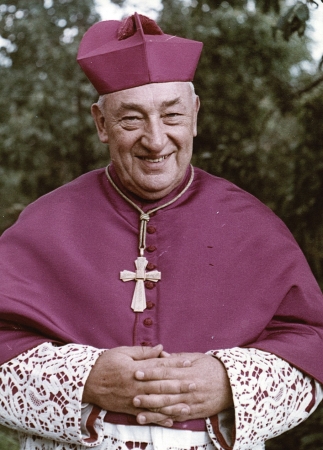
The oldest son of a Wallachian farmer, Štěpán, was born in the village of Francova Lhota on Mar. 26, 1905. He started his studies at the Archbishop Grammar School in Kroměříž, but had to discontinue them and return home to help his mother who was suff ering from tuberculosis. As soon as her health condition improved, he set out for Turin, where in 1932 he became a Doctor of Theology and a priest. After returning home and fi nishing his military service he fully devoted himself to his clerical and Salesian duties.
During the occupation he was a member of the Salesian Society in Kobylisy. However, the Gestapo could hardly tolerate its existence. As the director of this institution he was interrogated several times by the Gestapo trying to fi nd a reason to arrest him. Finally they found it – the Exiled Government, which had fl ed to Paris, possessed a list of persons who could be used for “important tasks”. Trochta’s name was probably on this list, which the Germans managed to seize, nevertheles he was arrested after the assassination of Heydrich. Trochta was taken into custody the next day when at two in the morning four Gestapo offi cers headed by Oberhauser of the anti-clerical department came to his place and kicked the door down. Trochta was taken to the Gestapo offi ce where he was brutally interrogated till late at night and then moved to Pankrác. His fi le was marked with the note: RU (Rückkehr unerwünscht – return undesired).
He was taken to the Small Fortress in Terezín, where he met for example Prelate ThDr. Otkar Švec and Monsignor Josef Beran, the seminary rector. Trochta was put in Cell No. 12. The position of priests in the Small Fortress was much worse than of other prisoners. Guards used to torment and chase them, mainly Rojko was extremely brutal. Trochta was placed in a work group building the railway in Ústí nad Labem. He also worked at a carbon silicide producing plant in Čížkovice, where he managed to send a secret message through a daughter of a local worker to the Kobylisy institution begging for new boots. Soon after this a Salesian, Vojtěch Šilar came to Terezín, with the boots. At the end of September 1942 he was transported to Mauthausen, where he stayed almost to the end of 1944. However, he saw Christmas 1944 in Dachau. After the liberation of the camp he returned to the Salesian monks in Prague on May 23, 1945 and on Nov. 16, 1947 he was appointed Bishop of Litoměřice. In 1948–1949 as spokesman of the Episcopal Conference he helped in negotiations with the communist government, but in 1953 he was arrested and a year later in a show trial sentenced to 25 years in prison. Thanks to the 1960 amnesty he was released and during the “Prague Spring” rehabilitated on Jul. 19, 1968. He again started carrying out his offi ce as Bishop. In April 1969 he was named cardinal in pectore by Pope Paul VI and this secret appointment was published in 1973. Štěpán Trochta died on 6th April 1974 of a stroke when he was literally “shouted to death” by the Regional Church Secretary Karel Dlabal. However this was not enough for the communist authorities. Some foreign guests were not allowed to take part in the funeral, others could not assist during the mass or even say a few words. Nevertheless, Krakow Archbishop Karol Wojtyła (later Pope John Paul II) violated the offi cial ban and declared him a martyr.
Text prepared by: Luděk Sládek
Photo:: Památník Terezín, Wikipedie, www.sdb.cz
Nesouhlas se zpracováním Vašich osobních údajů byl zaznamenán.
Váš záznam bude z databáze Vydavatelstvím KAM po Česku s.r.o. vymazán neprodleně, nejpozději však v zákonné lhůtě.